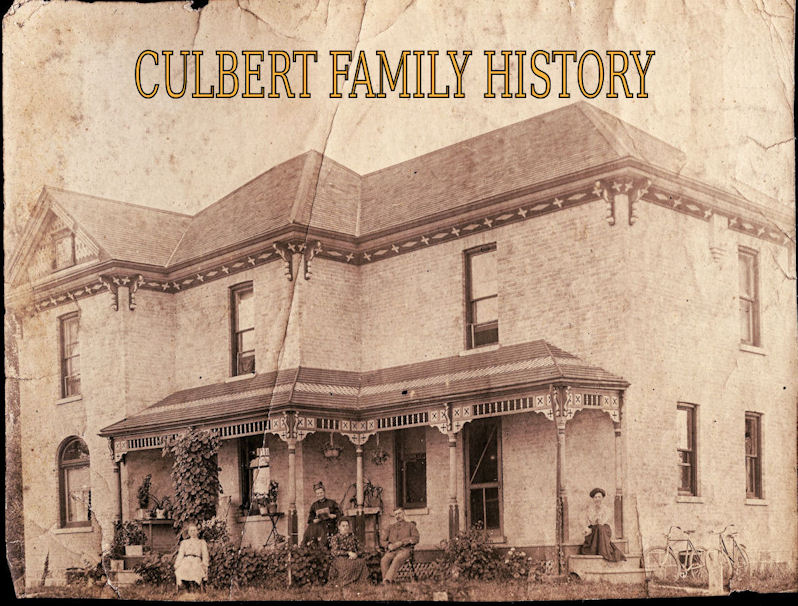The photo below shows Sergeant Ivan Hector Culbert
(1918-1979), the great-grandson of John Culbert and Mary Ward. Ivan joined the Royal Canadian Regiment on 8 January 1940 and served
overseas until he returned home in January 1946 with his war bride, Elvira Hutchings.
 |
| Photo courtesy of Ivan Culbert’s son, Phil Culbert. |
Ivan was stationed in England when this photo was taken, far from his home on Poplar Farm near Lucan, Ontario. The little British boy with a tin can was begging for money to get something to eat. Ivan kindly gave the boy a coin.
We don’t know the identity of the boy. One wonders if he was part of Operation Pied Piper in which the British government relocated millions of children out of urban centres to rural locations in Britain and even overseas. It was assumed that the risk of bombing would be lower in the countryside, and so the children would be out of harm’s way.
Mothers were reluctant to be separated from their children but were told it was in their best interest. Propaganda such as the poster below discouraged mothers from the temptation to bring their children back to the city …
Long lines of children were led to bus and train stations to begin their journeys to the countryside. Each child was given a box containing a gas mask and a few personal belongings. Each child wore a label with their name on it, pinned to their coat, in the same way that you would label your luggage.
 |
| Children about to board a train to the countryside, wearing name labels pinned to their coats. |
The character of Paddington Bear was inspired by author Michael Bond’s recollections of watching newsreels of children being evacuated.
"When I was small, I had memories of children being evacuated from London with a label around their necks and all their possessions in a suitcase, and this became part of Paddington," said Michael Bond.
"Paddington Bear was a refugee with a label - 'Please look after this bear. Thank you', and he had a little suitcase."
BBC History describes the man in charge of evacuation, Sir John Anderson, as a cold, inhuman character with little understanding of the emotional upheaval that might be created by evacuation. There was no careful selection process as to how and where the children were placed when they arrived in the countryside. Children were billeted with hosts who were paid, and who were invited to “take their pick” as the children lined up against walls or in the village halls.
Life in rural areas was a shock for urban children, unaccustomed to the lack of indoor plumbing and running water. Many children had never seen farm animals. Most children were not told where they would be going, why they were going nor why their parents weren’t coming with them. It was a time of adventure for some but for others it was traumatic and lonely.
After the war, many children returned to homes which were missing a parent who had died in service or as a result of the bombings. In some cases, children lost both their parents. After years away from their families, some of the children who had been quite young at the time of the evacuation didn’t recognize their own parents.
Looking back on Operation Pied Piper, it was concluded that wrenching children away from their families for the duration of the war was more traumatic than the risk of bombing. Thankfully, many children had been spared the horrors of bombing that took place in the cities. However, evacuation wasn’t always as safe as it seemed. Hundreds of evacuees were killed while enroute to safe havens. Some were killed after being relocated, by minefields or other wartime hazards.
Many children were fortunate in that they had positive experiences with their hosts who treated them well and with kindness. Some children enjoyed their new rural homes so much that they didn’t want to go back to the city. Sadly, that wasn’t the case for all children. Some suffered from ill treatment and sexual abuse.
What became of the little boy in our photo? We don’t know his name or his story. Was he part of Operation Pied Piper? Was he orphaned? We can only hope that he had a chance to grow up safe and loved. And we can note that a Canadian soldier – a descendant of John Culbert and Mary Ward - cared enough to give that little boy a coin.
In 2018, Phil Culbert wrote a tribute to his father, Ivan Hector Culbert on the Culbert Family History blog. If you missed it, click here.
 |
| Ivan Culbert |
IVAN HECTOR CULBERT'S FAMILY TREE:
Ancestors:
John Culbert & Mary Ward (great-grandparents)
Richard Culbert & Jane Eleanor Fairhall (grandparents)
Myron Manford Culbert & Effie Pearl Taylor (parents)
Ivan Hector Culbert
Descendants (Children):
Victoria "Vicky" (Culbert) Schloendorf
Ian Richard Culbert
Phillip Myron Culbert
Elizabeth Christine Culbert (1955-2020).



